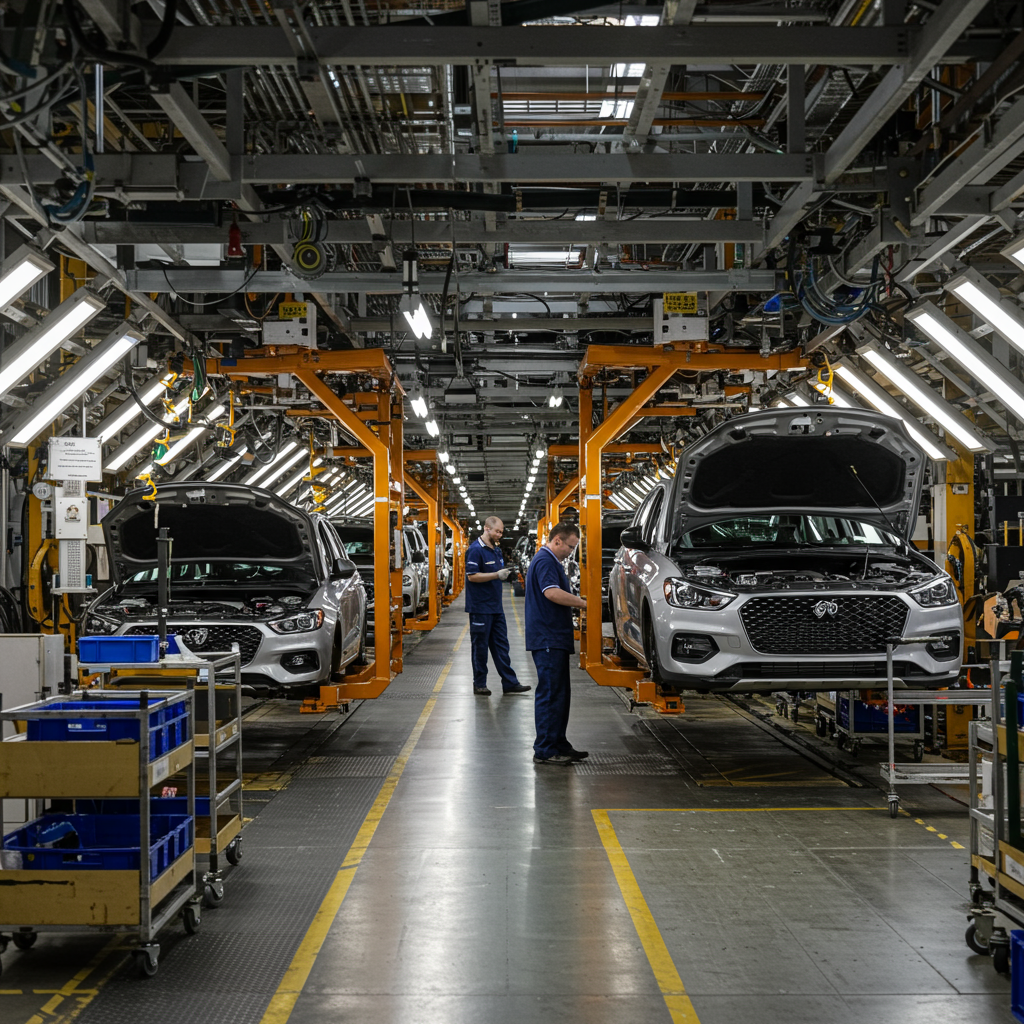UK car manufacturing suffered a significant decline in April 2025, with production falling to its lowest level for the month in over 70 years, excluding the unprecedented disruption caused by the Covid-19 lockdown in April 2020.
According to data released by the Society for Motor Manufacturers and Traders (SMMT), just 59,203 vehicles rolled off UK assembly lines in April. This figure represents a stark 16% decrease compared to April of the previous year and a 25% drop from March 2025’s output. Looking back further, this is the lowest April production level seen since 1952, when 53,517 vehicles were made. The cumulative production total for the first four months of 2025 also paints a challenging picture, marking the weakest start to the year since 2009.
Why Did Production Fall So Sharply?
Several factors converged to create this challenging environment for UK car makers in April:
Impact of US Tariffs: A major contributor was the effect of President Trump’s 25% tariff on steel, aluminium, and cars. Manufacturers likely boosted shipments to the US in March to get ahead of these tariffs, artificially inflating that month’s figures and leading to a subsequent drop in April. British carmaker Jaguar Land Rover (JLR), for instance, highlighted the significant cost of paying a 27.5% tariff on all exports to the US, describing the expense as “huge.” JLR also expressed frustration that a new UK-US trade deal, agreed in early May to reduce tariffs on cars to 10% (up to a quota), was taking too long to be implemented.
Easter Holidays: The timing of the Easter break falling in April this year meant fewer potential working days for factories, naturally impacting monthly output figures.
The Shift to Electric Vehicles (EVs): The broader, ongoing transition across the industry from traditional internal combustion engine vehicles to EVs also played a role. This shift involves significant retooling and adjustments to production lines, which can temporarily reduce output volumes.
Weak Export Demand: Production for export markets, which account for a substantial portion of UK output, saw a significant 10.1% fall in April. This was heavily influenced by reduced demand from key export destinations like the US and the EU. While exports to the EU specifically dropped by a notable 19.1%, showing the impact there, it still accounts for over half of UK car exports. Exports to the US saw a smaller 2.7% decrease. Interestingly, exports to China and Turkey bucked the trend, showing strong increases of 44% and 31.2% respectively.
Domestic Market Resilience (But Still Down)
While the export market faced significant headwinds, the picture for the UK’s domestic market was slightly less severe. Production for the UK market saw a smaller decline of 3.3% compared to April last year. Nathan Coe, CEO of online car seller Autotrader, suggested the domestic market remains relatively “buoyant” with strong sales of new and used cars compared to the hard-hit export sector. He speculated that the UK could become a more attractive market for foreign automakers given the high cost of selling cars in the US due to tariffs. However, SMMT figures confirm that overall domestic production was still down in April.
Part of a Global Trend, Yet Facing Unique Pressures
Industry experts note that the downturn in UK car production is not an isolated event. Professor Peter Wells, Director of the Centre for Automotive Industry Research at Cardiff University, highlighted that similar downward trends are being observed in other major car-producing nations, including Germany, Italy, France, and Japan, suggesting a broader global challenge.
However, Professor Wells also pointed out that some global pressures might be amplified in the UK. He cited potentially fewer trade barriers against Chinese imports compared to the EU and US as one factor. Furthermore, uncertainty created by recent UK government policy changes regarding the encouragement of EV manufacturing is making planning more difficult for carmakers. April saw announcements about relaxing sales targets for EVs and reducing fines for failing to meet emissions standards, adding to the industry’s concerns. This follows a pattern of uncertainty, including past plant closures by manufacturers like Honda and Ford, and a warning from Stellantis (maker of brands like Vauxhall and Peugeot) last year about potentially halting UK production due to a lack of clarity on the government’s EV approach.
Professor Wells stressed the critical need for “stability and clarity in policy,” whether related to tariffs, electrification, or other issues, describing the current environment as remaining “volatile.” Mike Hawes, SMMT chief executive, echoed this, calling for urgent action to boost domestic demand and international competitiveness and emphasizing that securing vital investment depends on a competitive environment supported by a comprehensive, long-term government industrial strategy.
Signs of Potential Amidst Challenges
Despite the difficult April figures and the current volatility, there are some signals of potential future growth. The SMMT hopes that new trade deals currently being pursued or implemented with key partners like the US, EU, and India will help create opportunities to boost upcoming production.
Furthermore, recent investment announcements offer glimmers of optimism. Toyota is reportedly investing £41 million to build its GR Corolla model at its Derbyshire plant, targeting the North American and EU markets – a move potentially bolstered by the new UK-US trade deal reducing tariffs. Nissan has also confirmed that updated and new EV models (Leaf and Juke EV) will be built at its Sunderland plant by the end of next year, a plan supported by a £1 billion government loan aimed at securing jobs.
These investments, although announced during a challenging period, underscore the UK’s potential as an automotive manufacturing location, particularly as the industry navigates the complex global transition to electric mobility.
References
- https://www.bbc.com/news/articles/ckgrydlqqn8o
- https://www.bbc.co.uk/news/articles/ckgrydlqqn8o
- https://www.aol.com/uk-car-production-falls-sharply-230211268.html
- https://www.thisismoney.co.uk/money/cars/article-14760813/Car-factories-UK-recorded-lowest-output-70-years-did-production-plunge-April.html
- https://ca.news.yahoo.com/uk-car-production-falls-sharply-230211179.html




